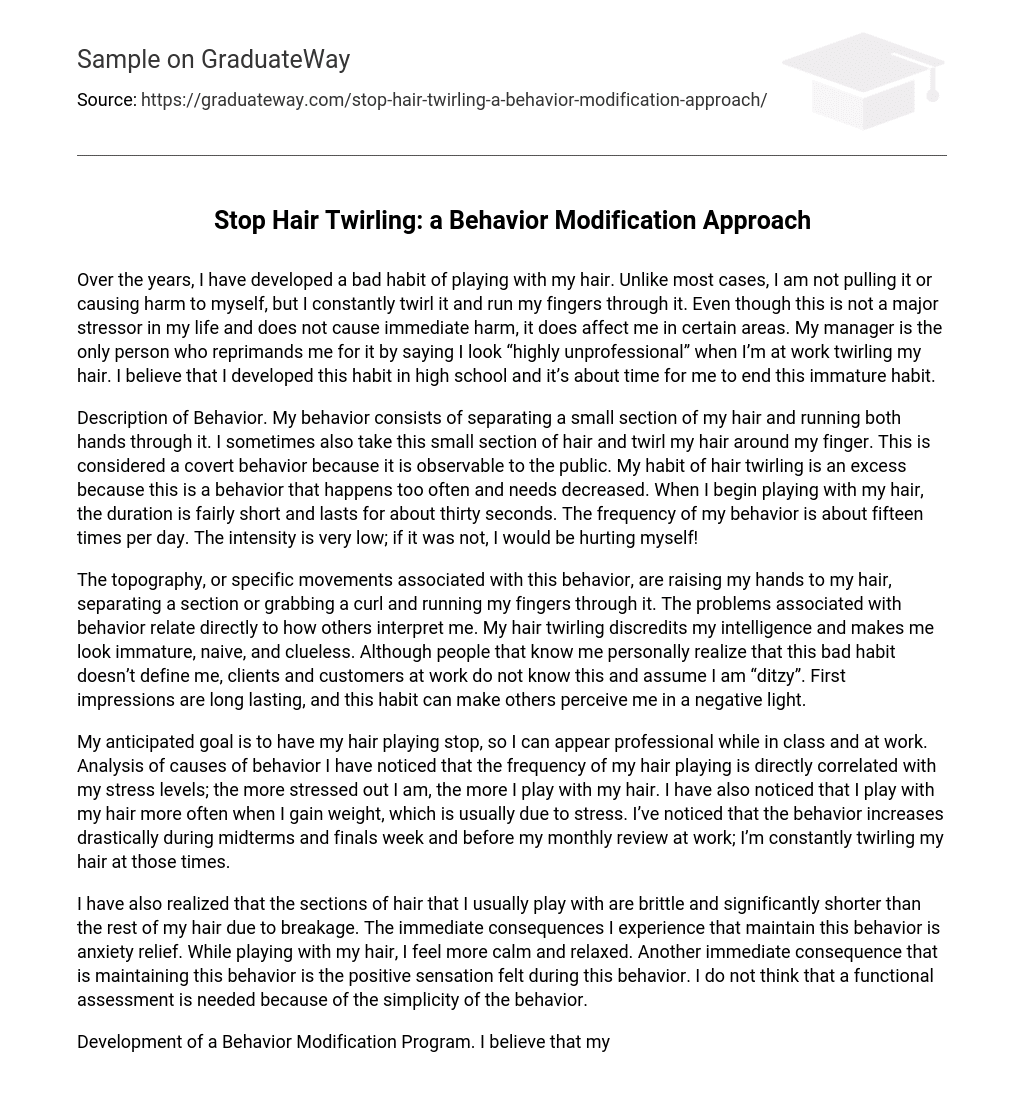Throughout the years, I have developed a unique habit involving my hair. Unlike most people who pull or harm their hair, I constantly twirl and run my fingers through it. Although this habit does not cause me significant stress or immediate harm, it does affect me in certain ways. Specifically at work, my manager is the sole individual who criticizes this behavior as “highly unprofessional.” I believe I acquired this habit during high school and now feel it is time to maturely cease it.
Description of Behavior: The behavior involves separating a small section of hair and using both hands to run through it. Additionally, I sometimes twist this section of hair around my finger. This behavior is classified as covert, as it can be observed by the public. Hair twirling is considered excessive and needs to be reduced in frequency. When engaging in this behavior, the duration is typically short, lasting for approximately thirty seconds. The frequency of hair twirling occurs about fifteen times per day. Although the intensity of the behavior is low, if it was higher, it could potentially cause harm.
The way I move my hands to my hair, whether it’s raising them, separating a section, or grabbing a curl and running my fingers through it, constitutes the topography of this behavior. The consequences of this behavior are directly tied to how others interpret it. Unfortunately, my habit of twirling my hair undermines people’s perception of my intelligence and makes me appear immature, naive, and clueless. While those close to me understand that this habit does not define who I am, clients and customers at work who are unfamiliar with me assume that I am “ditzy.” It’s important to remember that first impressions are powerful and lasting, so this habit can lead others to form a negative impression of me.
My main objective is to cease manipulating my hair in order to maintain a professional appearance during class and work. Upon examination of the causes behind this behavior, I have observed a direct correlation between the frequency of hair manipulation and my stress levels. The more stressed I feel, the more I engage in hair playing. Furthermore, I have noticed an increased tendency to play with my hair when I experience weight gain, which is typically a result of stress. Additionally, this behavior intensifies significantly during midterms and finals week, as well as prior to my monthly review at work; during those periods, I consistently twirl my hair.
After noticing that the sections of hair I usually fiddle with are brittle and much shorter than the rest, I’ve come to understand that breakage is the cause. The act of playing with my hair helps alleviate anxiety, leaving me feeling calmer and more relaxed. Moreover, there is a pleasant sensation associated with this behavior. There is no need for a functional assessment as the behavior is quite straightforward.
Development of a Behavior Modification Program. My manager implemented positive punishment as an effective strategy to eliminate my hair twirling habit. To ensure its success, I plan to inform my family, friends, and coworkers about my behavior modification program. I will explain to them how they can contribute by administering an unpleasant stimulus whenever I engage in hair twirling. For instance, my parents could assign me household chores, my managers could have me take out the garbage, and my friends could request that I review their homework or papers.
A consistent schedule of positive reinforcement will be implemented in order to achieve rapid behavioral change. The individuals responsible for administering punishments include my parents, friends, and managers. I firmly believe that positive punishment will be highly effective for me due to my strong inclination towards pleasing others and constantly striving to make them happy. The prospect of seeing those close to me become upset serves as a motivating factor for me to discontinue playing with my hair. Additionally, given my aversion to confrontation and desire to avoid punishment, I anticipate responding positively to positive punishment.
There should be a single verbal warning per day before I receive punishment. The warning should be along the lines of, “Sara, if you repeat this action again, you will be responsible for taking out all the garbage!” This type of warning would be effective. In order to minimize the occurrence of this behavior, I can reduce stress and incorporate yoga into my routine. Additionally, I can make an effort to procrastinate less, although I hardly procrastinate anymore to prevent anxiety. I have already taken steps to reduce the causes of this undesirable behavior by practicing breathing exercises and utilizing mindful thinking therapy strategies to keep myself calm.
One way of behavior modification that I can utilize is called differential reinforcement of zero. This means that if I refrain from engaging in the negative behavior altogether, I can give myself a treat such as a massage or a fancy dinner to reward myself. The positive and relaxed emotions I would experience from these activities would serve as reinforcement to encourage me to continue behaving differently. Whenever I feel the urge to fiddle with my hair, I could occupy my hands by engaging in other small tasks, like solving a Rubik’s cube.





